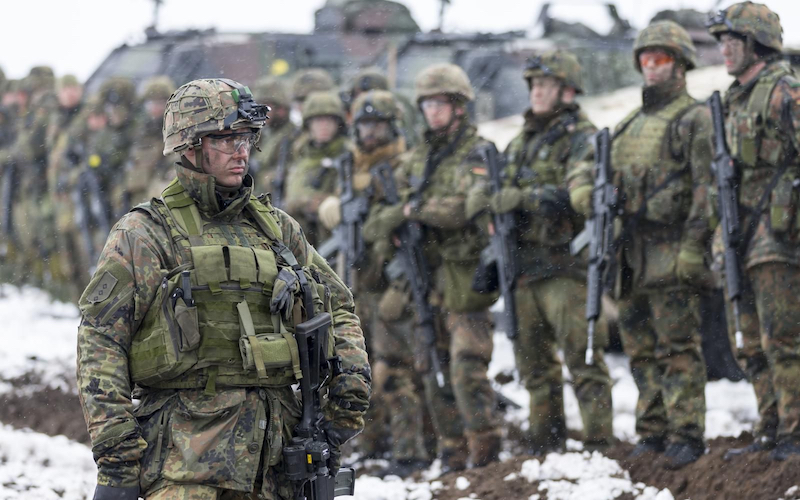
The Future of European Defense
The 2016 white paper, concerning the development of German defensive interests, defined an inter-European military coalition to be at the center of Germany’s role within the European Union (EU). The opinions of young officer cadets in the United Kingdom and Germany, however, were highly divergent in relation to a European defense alliance. The results of a study carried out in 2014 with 755 officer cadets from the Royal Military Academy Sandhurst and the Military Officer School (Offizierschule des Heeres) in Dresden did not only reflect the Euro-skeptic position of the British people (which reached its peak in 2016 with “Brexit”), but also the German soldiers’ skeptical position in regards to a Europeanisation of military matters.
Approaches towards a European Army
More than half of the British and German army officer cadets were unable to imagine the creation of a transnational European army serving as a supplement to their existing national forces. Although more British than German cadets were able to imagine the creation of a European army, considerably more British (65%) than German cadets (40%) opposed such an enterprise overall.
The majority of British cadets who were not in favor of the establishment of a European army referred to language and educational barriers between Europe’s soldiers and were not able to imagine being commanded by officers from other European nations. Many of them also questioned the fighting strength of a European army, since they believed that most of their comrades’ occupational motivation was nationally focused, making it difficult for them to represent European and not primarily British interests. The majority of the German cadets, in contrast, felt no potential conflict of interest regarding this matter and referred to already existing commitments to NATO as well as collective interests within the EU.
Both British and German cadets reckoned that logistical and conceptual problems would hinder the realization of a European army: soldiers from both countries referred to problems in terms of sovereignty, deployment issues, and the balance between family and work just as much as the cultural and economic differences within the EU, possibly hindering international cooperation in a European Army framework.
Noticeably, many of the British soldiers referred to Britain’s “special relationship with the continent…geographically we do belong to Europe, but mentally I feel that Britain is a separate state,” one of the British cadets explained, adding that many British people feared the establishment of a European super state. In such a state, according to the aspiring British officer, Britain would only be one of many countries, which would not do justice to Britain’s imperial history as a world power. Furthermore, the officer cadets at Sandhurst feared that increased cooperation on a European level could amount to the dissolution of British military traditions that have existed for centuries.
Although in total, more German than British officer cadets were positive about the establishment of a European army, the German soldiers also referred to cultural differences between European nations and their fear of a unified military due to the EU still being in its infancy. One German cadet noted that “many Europeans don’t perceive themselves as European and therefore cannot cooperate on a European [army].”
Joint Combat Training for EU Officer Cadets?
Regarding the costs and benefits of a European Army and the budget cuts in many European forces, the attitude of the British cadets was considerably more dismissive than that of their German counterparts. The biggest difference between the soldiers’ approaches related to the joint combat training of EU junior leadership staff–whereas more than half of the German cadets welcomed joint combat training, the same proportion of British cadets strongly opposed it.
The British cadets were only willing to accept a merging of the aspiring European officers’ training in the framework of direct operational preparation for deployment in missions abroad. Many of the German cadets, in contrast, welcomed joint military training within the EU in order to improve their level of interoperability. Officer cadets from both nations who advocated the merging of combat training on a European level referred to the chance to learn from the strengths of their counterparts in order to develop a better understanding of the culturally-shaped conduct of their future coalition partners.
Only German cadets, however, spoke about the development of a multinational camaraderie and the attainment of equal standards in the framework of this training. The British cadets referred to the dangers of potentially losing national identity through joint training and the danger of disclosing sensitive information and specific army tactics towards a potential enemy nation. The last point was also picked up by the German cadets, implying that some British and German cadets can still imagine a potential war among EU states.
The British cadets’ critical attitude towards joint military training was, however, not always attributable to a collective disinterest in cooperating with soldiers from other European nations, but rather directed towards their perceptions of a dysfunctional EU. One of the British cadets explained his generally critical attitude towards military cooperation on a European level by stating that, “everyone wants to do what they are accustomed to and barely anyone wants to give up their own traditions just to work as part of a collective.”
The officer cadets’ views of Europe’s past did account for a large proportion of their different perceptions towards the EU today. Whereas a large proportion of the British cadets saw the European community as a quarrelsome, unstable construct, the majority of the German cadets considered the growing European community as profitable and empowering.
The Perception of Europe and the EU
What first came to mind when the majority of British soldiers talked about European history was war, violence and destruction, as well as disunity and chaos. The German cadets, by contrast, placed concepts such as community, cooperation, and a strengthening of the continent after the Second World War at the center of their perceptions of European history. Although the majority of the German cadets, like the British soldiers, did not classify themselves primarily as Europeans, the German junior leaders considered themselves as a part of Europe, and interpreted the collective growth of European states within the EU to be a result of the continent’s history stamped out of war. Only a few Sandhurst cadets shared this attitude. For example, one cadet stated that his “perception of Europe is entirely based on my knowledge of European history, a…continent transfixed in a vicious circle of crises.”
The aspiring British officers frequently indicated that they lacked an understanding of and were confused about European history ̶ seemingly always pervading to claims of power and competitiveness. “What I have learned about Europe seems to me like a big mess. It could be said: British history went back and forth – but I see more durability here than with European history…Perhaps the Europeans have a crisis of identity resulting from all these wars, crises, and conflicts, which they try to fill with their notion of a United Europe,” one of the British cadets explained.
Regarding the British people’s decision to leave the EU, the outcome of the referendum—the so-called “Brexit”—in June 2016 had already been alluded to in 2014. That is, in contrast to the majority of German cadets (71%), only one in four British cadets acted on the assumption that their country’s relationship with the EU would grow in the coming years. The result was similar regarding the EU’s role in military affairs. Whereas 62% of the German cadets assumed that the EU would play a bigger role in future military affairs, 44% of the British cadets dismissed such a change.
“Britain increasingly isolates itself from Europe. Unfounded anxieties are the basis for this. It has become trendy to talk negatively about the EU and to demand that we are able to trade and act with self-determination,” one British cadet reported in an interview in winter 2014. Whereas the cadets at Sandhurst considered British history to be the foundation of their national pride, the majority of the German cadets considered German history as a lesson. For example, “I believe history helps us to recognise what we do not want again; namely a war between the nations of Europe,” one of the aspiring German officers explained. One of his comrades added, “I simply have to listen to the history of my parents and grandparents, and compare it with the current positive situation – the EU is a peace project.”
It remains to be analyzed whether the ongoing refugee crisis, Brexit, the rise of nationalism in different European states, and the uncertain role of NATO after the election of Donald Trump to the White House have changed the British and German cadets’ perceptions towards European military defense. Should European politicians continue to call for a European army? Not only should the possibility of implementing this army in the future be examined more thoroughly, but it should also be ascertained whether the soldiers and officers of European nations are actually willing to serve in such an army.
Translated from German by Harry Prestwich.
This article was originally published on Strife, War Studies. Read the article in the German.

